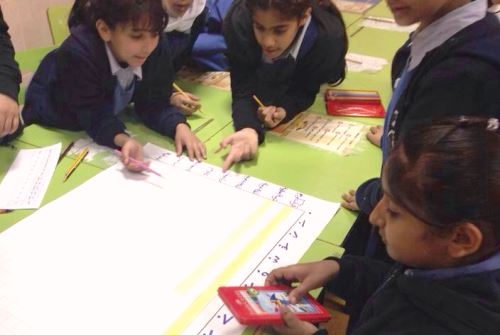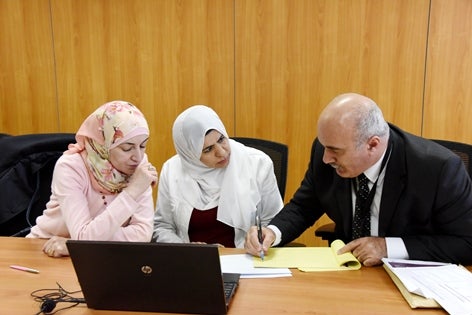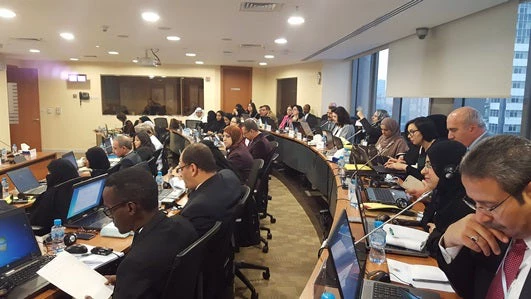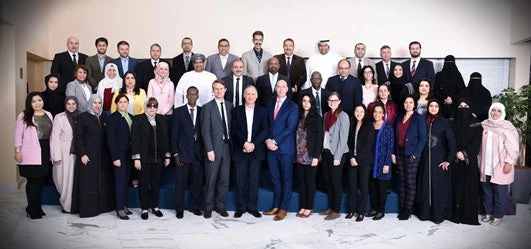Getting ready for the challenge, together
From February 19-23, 2017, fifteen countries in the Middle East and North Africa convened in Kuwait City to discuss the future of early childhood education in the region.
 Why should we care about early childhood education?
Why should we care about early childhood education?
The importance of the early years for children’s development cannot be overstated. Ample evidence from rigorous long-term studies suggests that high-quality early childhood education (ECE) yields numerous benefits for children that affect them well into adulthood. Better school performance, lower repetition rates, and fewer dropouts are only some examples of the wide range of positive impacts. In addition, ECE has also been associated with more productive economic trajectories in adulthood (see, for example, Gertler et al. 2014, Karoly 2016, Phillips et al. 2016., Dickens et al. 2006).
The international community has recognized the extraordinary potential of ECE to contribute to children’s wellbeing as well as countries’ development, and enshrined it in the Sustainable Development Goals (SDGs). In Target 4.2, countries have committed to “[b]y 2030, ensure that all girls and boys have access to quality early childhood development, care and pre-primary education so that they are ready for primary education”.
What does this entail for MENA?
To meet this ambitious target, the Middle East and North Africa (MENA) region will need to undertake enormous efforts. At 29.9 percent, the region’s pre-primary gross enrollment ratio is the third lowest in the world. It is two thirds that of the world average (44 percent), ahead of only sub-Saharan Africa (21.9 percent) and South Asia (18.2 percent). From this ratio, reaching Target 4.2 by 2030 will require the region to increase pre-primary enrolment by, on average, 5 percentage points every year. Naturally, this regional aggregate masks a wide heterogeneity in MENA countries’ enrollment ratios. While Lebanon (84.5 percent) and Algeria (79.2 percent) will need to expand ECE coverage to a relatively small and localized segment by 2030, most countries in the region will need to double or triple their coverage in the next decade, with Djibouti (4.7 percent) and Yemen (1.3 percent) having to develop an entire sub-sector altogether ( UIS, latest available year used for all countries and regions).
In working towards expanding ECE coverage to all, the region will face two important questions. The first question relates to the quality of ECE services. Are ECE programs in the region of high quality and yielding the expected benefits to child development outcomes to justify investing in them (and scaling them up)? The scarcity of relevant service delivery indicators and impact evaluations of ECE programs in the region does not allow for a conclusive answer, making the issue of monitoring and evaluation a top priority on the ECE agenda.
Second, the question of who gets targeted first by ECE programs is critical. While a key goal of ECE is to level the playing field for all children, ECE in MENA is highly inequitable, with family background largely determining whether a child will have the opportunity to benefit from ECE services. For example, in the West Bank and Gaza a child from the richest quintile of households is twice as likely to attend early childhood care and education (ECCE) (48 percent) as a child from the poorest fifth of households (24 percent). In Egypt, a child from the richest fifth of households is more than four times as likely to attend ECCE. The highest inequity appears to prevail in Tunisia, where the poorest children have a 13 percent chance and the richest an 82 percent chance of attending ECCE ( El-Kogali & Krafft 2015).
Getting ready for the challenge, together
The task ahead is indeed formidable, but the region has already made important strides. Last February, 39 technical experts representing governments of 15 MENA countries and territories (Algeria, Djibouti, Egypt, Iraq, Jordan, Kuwait, Lebanon, Libya, Morocco, Oman, Qatar, Saudi Arabia, Tunisia, the West Bank and Gaza, and the United Arab Emirates) convened at a High-Level Regional ECE Workshop in Kuwait, and discussed—for the first time—what it would take for the region to reach SDG Target 4.2.
Discussions were live and very rich. While participants from Ministries of Education reflected on the implications of scaling ECE on their teacher training programs, regional peers from Ministries of Family and Childhood brought parent education and support programs to the forefront of the discussion. In turn, officials from national centers for education research debated lively about the required capacity for monitoring and evaluation of ECE at scale, while a colleague from Ministry of Finance pointed to the issue of budget reallocation as a priority to achieve Target 4.2.
While countries’ strengths and challenges in ECE are certainly unique, by the end of the five-day workshop it became evident that together, countries could achieve more, and achieve it faster. The measurement tools of one country could serve as blueprints for its neighboring countries, while the teacher training materials of a second country could become a prototype for the entire region. As participants recognized that they themselves could be valuable resources to one another, a regional community of practice on ECE began to emerge.
A common roadmap for 2030
Determined to enable all children to develop their full potential, delegations pledged to resolutely pursue the ambitious yet fundamental goal of expanding quality ECE to all children in MENA. In pursuit of this goal, they agreed on a common roadmap for 2030. A key element of this roadmap is the establishment of interim country-level targets, which aim to provide clear milestones and galvanize unprecedented support for ECE from national, regional, and international stakeholders. These country-level targets touch upon all dimensions of ECE. For example, the roadmap calls on countries to prioritize equity and review their current ECE policies to include explicit strategies to reach the most vulnerable children, including those with special needs.
Country delegations also committed to place quality at the heart of their ECE agenda. The common roadmap envisages countries to set national targets for a variety of policy mechanisms for assuring ECE quality, including the creation of research-based national curricula, the provision of improved pre-service training and ongoing professional development opportunities for preschool teachers, and the continuous monitoring and evaluation of ECE programs.
The regional dimension of the ECE agenda was at the forefront of Workshop deliberations. In their efforts to expand ECE to all children by 2030, country delegations emphasized the benefits of a regional approach that taps into economies of scale and creates synergies across MENA. The creation of regional public goods, such as regional minimum standards for ECE delivery based on international best practices, and a regional tool for measuring child development outcomes, could play an important role in facilitating and promoting the active pursuit of MENA’s common vision.
The current momentum for ECE in MENA provides a unique window of opportunity for national governments, development partners, and other relevant stakeholders to establish effective partnerships and mobilize the resources needed to significantly accelerate high-quality ECE provision in the region and provide generations of children with the best possible conditions to thrive and develop their full potential.
____________________________________
This Workshop was organized as part of the Education for Competitiveness (E4C) initiative – a regional initiative launched jointly by the World Bank and the Islamic Development Bank with the objective of supporting countries to improve their education systems. Representatives from the United Nations International Children’s Emergency Fund (UNICEF), Results for Development (R4D), and other leading international education specialists also participated in the Workshop.






Join the Conversation